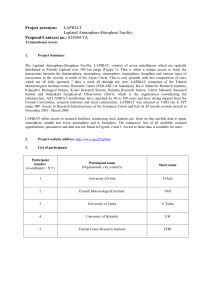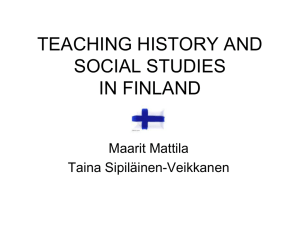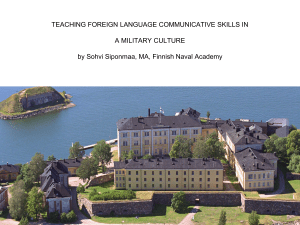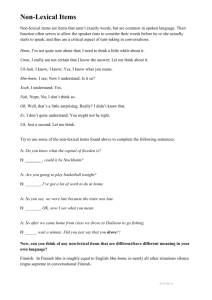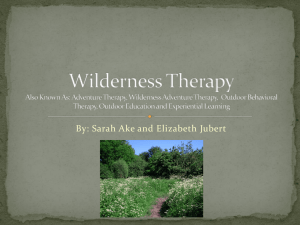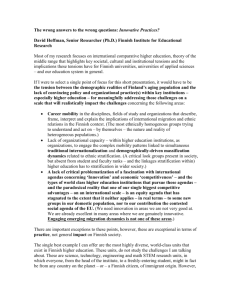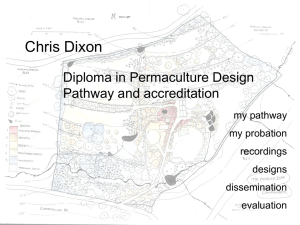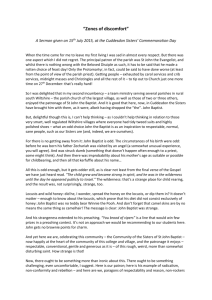Seitsemän veljestä
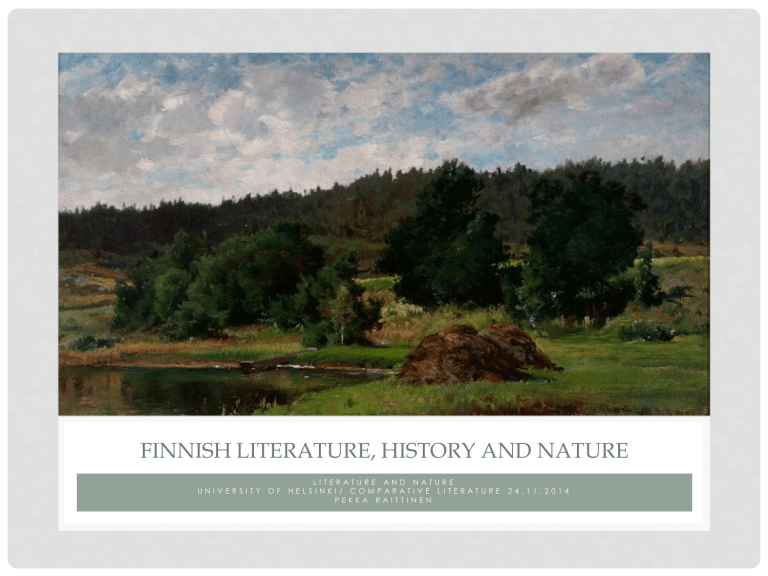
FINNISH LITERATURE, HISTORY AND NATURE
L I T E R A T U R E A N D N A T U R E
U N I V E R S I T Y O F H E L S I N K I / C O M P A R A T I V E L I T E R A T U R E 2 4 . 1 1 . 2 0 1 4
P E K K A R A I T T I N E N
OUR ROOTS IN WILDERNESS?
”ERÄMAA”AND ”KASKI”
• Fishing and hunting – erätalous s.c.
”wilderness economy”
• Runeberg’s
Hirvenhiihtäjät (”The Elk-
Slayers”) – ”The balance of nature and society” (Wrede, 1999)
• Seitsemän veljestä – slash-and-burn agriculture and civilization
Jo joutui armas aica,
Ja Suwi suloinen
Joll caunist caicen paican
Caunista cuckainen.
Nyt armas Auring meitä,
Taas lähte lähemmäx
Hän cuolleet hauto, heitä
Jäll teke eläwäx
”NATURE RENEWED”– RENAISSANCE
NEOPLATONIC OPTIMISM
• Tuomas M.S.
Lehtonen (1999) =>
Dichotomy of optimism and memento mori
• Robert Cajanus (1675
– 1737) => ”Suvivirsi”; from a Swedish source
• Memento mori;
Juhana Cajanus Etkös ole ihmisparca aiwan arca (1681)
PANORAMIC VISION
• Kai Laitinen: Metsästä
kaupunkiin, 1984
• Runeberg:
”Heinäkuun viides päivä” (”5th of July”)
• The motif continues in
Kivi’s Seitsemän
veljestä and poem
”Isänmaa”
(”Fatherland”)
NATION = NATURE
Werner Holmberg: Ideal
Landscape, 1860 Thomas Cole: A Home in the
Woods, U.S.A., 1847
ALEKSIS KIVI, SEITSEMÄN
VELJESTÄ AND NATURE
ALEKSIS KIVI (1834 – 1872)
• Born Alexis Stenvall
(”Stonewall”)in
Nurmijärvi, son of a village tailor
• Collection of poetry
Kanervala (1866); plays;
Nummisuutarit (”The
Heath Cobblers”)
• The Seven Brothers
(1870) – First Finnish novel proper and source for contoroversy
IMPIVAARA – A RETREAT TO THE
WILDERNESS
• Seven brothers retreat to the woods and return to civilization after ten years
• Has often been read as a
Bildungsroman
• Intertexts Schiller
The Robbers;
Walter Scott Rob
Roy
NATIONAL ROMANTICISM
VERSUS ”THE GREEN GOLD”
”OUR LAND IS POOR…”
• Famine years 1866 –
1868; and 1695 –
1697
• Physiocracy =>
Wealth of the nations from agriculture
• Väinö Linna: Under
the Northern Star trilogy (1959 – 62)
THE QUEST FOR REALISM
• A National ”Grand
Narrative”=>
Literature building the nation and language
• First generation realists: Juhani Aho,
Minna Canth,
Teuvo Pakkala
• But also; turn of the century symbolism of Eino Leino, L.
Onerva et al.
JUHANI AHO, SHORT PROSE AND
CONSERVATION (HAAPALA 2008)
• Aho’s short Lastuja
(1891 –
1899)(”Woodchips”) and short prose on travelling and fishing
• Autobiographical stories on fly fishing salmon
• Plans to conserve
Huopana at
Viitasaari, ”Heartland of Finland”
AINO KALLAS, HISTORY, DESIRE AND
ECOLOGY (MELKAS 2006; 2008)
• Finnish-Estonian heir to symbolism
• 1920’s ”Slaying Eros” trilogy of novellas; The
Wolf’s Bride (1928) set in 17th and 18th century Estonia
• Short story ”Pyhän joen kosto”; ”The
Revenge of the
Sacred River”
TIMO K. MUKKA AND ”VIRGIN LAND”
(LAHTINEN 2008; 2014)
• Mukka’s (1944 – 1973) books set in his native
Lapland
• Debut novel ”The
Earth is A Sinfull Song”
(1964)
• After Second World
War flight from the countryside to the cities of the Southern
Finland
ON THE MARGINS
• A strong tradition of Finnish wilderness literature => An ideal[ized] subject [Finnish] male
• Sci-fi writer Johanna Sinisalo
=> Inheritor of Kallas’s themes of sexuality and transformation
• Finnish-Swedish contemporary fiction;
Monika Fagerholm The
American Girl (2004); Ulla-
Lena Lundberg Is [’Ice’]
